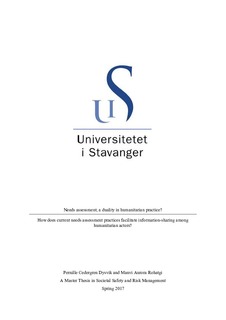| dc.description.abstract | The current state of humanitarian emergencies stands unprecedented, and have placed humanitarian efficiency at the top of a common agenda. However, any discourse on the efficiency of humanitarian assistance demands that, firstly, the needs must be assessed in a reliable way, and secondly, information about these needs must be shared with other actors involved in the response. This explorative research therefore aims at answering how current practices in needs assessment facilitates information sharing among humanitarian actors. The theoretical framework draws on the strengths form both traditional safety science, and modern organizational theory. By placing humanitarian NGOs under the umbrella of utility-maximizing actors, this thesis argues that the systemic issues must be regarded as organizational failures. Furthermore, the theoretical stance allows for a systemic-understanding of the humanitarian sector, grounded in the presumption that the humanitarian system works as one, is mutually dependent on their members, and that challenges must be coped with together. The study is based on in-depth interviews with a range of humanitarian personnel, combined with an extensive document analysis.
The empirical findings indicate a deviation between normative and actual practices of needs assessments, resulting in a complex picture of how information processing takes place. In extension, a fragmented system, with a strong sense of compartmentalization, combined with a lack of overarching authority, both allows these shortcomings to continue, and provides little incentive to initiate change. Consequently, the process of needs assessments lacks a holistic approach, and continue to be conducted subjectively, through organizational blinders.
The actual role of needs assessments serves a purpose as internal policy documents, instrumental to gaining funding, rather than an evidential basis for objective humanitarian needs. Their role in facilitating information sharing is therefore weak, as they are not mean to be used cross-sectorial, or inter-organizationally. | nb_NO |
